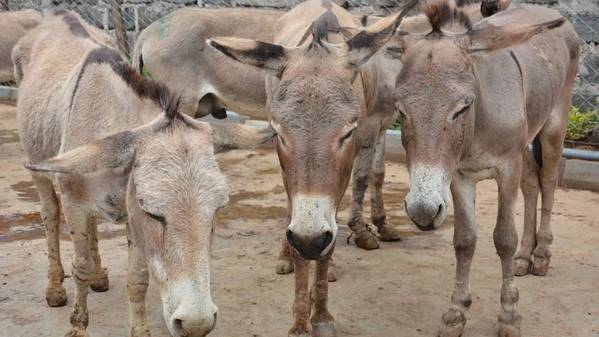
On World Donkey Day (May 8), international animal welfare charity, The Donkey Sanctuary, acknowledges Swire Shipping as the first global shipping line to commit publicly to a ‘No Donkey Skins Carriage policy’.
In February last year, African Heads of State and Governments endorsed a continent-wide moratorium on the slaughter of donkeys for their skins at the 37th African Union Summit. The agreement was made in recognition of animal welfare concerns and the vital role donkeys play in supporting communities and economies across Africa.
Millions of donkeys are killed for their skins each year, with the vast majority of skins exported across the world by sea and used to make traditional medicines and remedies. This decision by Swire Shipping - which comes into immediate effect on May 8 – represents a significant step in efforts to curb this damaging trade.
The move follows the announcement last year by Emirates that it was banning the transportation of donkey hides on its flights worldwide.
The Donkey Sanctuary believes the actions of these two industry leaders will create momentum and encourage others in the transport sector to follow suit. Restricting the international movement of donkey skins will help protect dwindling donkey populations in parts of the world where communities rely on donkeys for their livelihoods.
Research commissioned by The Donkey Sanctuary and undertaken by the University of Oxford’s Saïd Business School and Wildlife Conservation Research Unit (WildCRU) uncovered significant evidence linking the movement of donkey skins with other illegal wildlife trafficking and organized crime.
Container shipping is the dominant method used for the smuggling of large quantities of wildlife products, due to cost effectiveness, the ability to ship large volumes and heavier weights with low detection rates.
Shipping codes help mask the movement of donkey hides, with other wildlife products often hidden in their midst. For example, the World Customs Organization Harmonized System Code 410120 covers all equine and bovine-derived skins. Unscrupulous traders use the code knowing it discourages inspection, allowing them to conceal other illicit, *CITES-listed species such as pangolin scales, shark fins, tiger skins and elephant ivory in the stacked layers of legal hides.
Decisive action from industry leaders like Swire Shipping and Emirates to ban the carriage of donkey skins, creates impetus for robust transportation policies, screening measures and inspection procedures to ensure only legitimate shipments are cleared, ultimately halting illegal trafficking and other illicit trade in its tracks.
Marianne Steele, CEO of The Donkey Sanctuary, said: “The inhumane and unsustainable trade in donkey skins acts as a trojan horse for illegal wildlife trafficking and organized crime, and poses a serious threat to global biosecurity and the risk of zoonotic disease.
“Swire Shipping and other leaders in the transport sector should be commended for their decisive action and we call on other cargo operators, both in shipping and aviation, to join the fight to protect the world’s donkeys and the communities who rely on them. In doing so they will also help prevent the trafficking of other threatened species.”
Susana Germino, Chief Sustainability & Energy Transition Officer at Swire Shipping, said: "We are proud to support the work of The Donkey Sanctuary by including a ban on donkey skins in our updated Responsible Cargo Carriage Policy. This decision underscores our unwavering commitment to sustainability and ensures that our operations do not contribute to any trade that is illegal or threatens the survival of donkeys, whether wild or domesticated.”
In a previous report, The Global Trade in Donkey Skins: A Ticking Time Bomb, The Donkey Sanctuary highlighted how tiger hides, rhino horns, pangolin scales and elephant ivory have been found hidden among donkey hides in containers destined for China.
In research funded by the charity - undertaken by Oxford University’s Saïd Business School and Wildlife Conservation Research Unit (WildCRU) - evidence of 382 individual traders were identified on business-to-business eCommerce sites offering donkey hides, with almost 20% of those traders also selling other wildlife products.
In some cases, The Donkey Sanctuary uncovered these traders were additionally trafficking narcotics, fake passports and human hair, providing further evidence of how deeply the donkey skin trade is embedded in organized crime.
The skin trade is frequently chaotic, covert and hazardous. A largely unregulated and untraceable international trade, in a product that is frequently derived from the unhygienic slaughter of donkeys of unknown health status and origin, creates a high risk of disease, including zoonotic disease transmission.
The Donkey Sanctuary is an international animal welfare charity dedicated to improving the lives of donkeys and mules worldwide. Headquartered in Devon, UK, it provides lifelong care to over 7,000 donkeys across the UK and Europe, through 10 sanctuaries and guardian homes.



